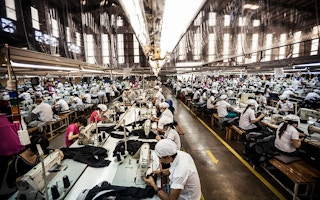A rising tide of industries moving operations from China and India to less-developed Asian countries undermines global targets to reduce climate-changing emissions, researchers said.
Many energy-intensive industries, including manufacturing and raw materials processing, are relocating to cheaper countries like Indonesia, Vietnam and Thailand, a study by Britain’s University of East Anglia (UEA) showed on Monday.
“The Chinese production system is starting to transform to be more higher value-added,” said Dabo Guan, professor of climate change economics at UEA and a co-author of the report.
“The price of labour in China has increased quite a lot,” he told the Thomson Reuters Foundation.
The shifts in production and trade will make it harder to meet the Paris Agreement goal of cutting emissions enough to keep the rise in global average temperatures to “well below” 2 degrees Celsius (3.6F) above pre-industrial times, Guan said.
Efforts by smaller developing nations have a growing role to play in staying below that limit - but it could be jeopardised by the new pattern of manufacturing, the report added.
It found that trade among developing nations - known as “South-South” trade - more than doubled between 2004 and 2011.
Energy-intensive industries, such as electronics and steel production, have come under pressure to clean up in recent years as Beijing looks to cut emissions, improve working conditions and reduce air pollution in its towns and cities.
Meanwhile, the growth of carbon emissions generated in the manufacture of Chinese exports has slowed or reversed, while emissions embedded in exports from less-developed countries like Vietnam and Bangladesh have surged, the report said.
International trade increased by more than 50 per cent from 2005 to 2015, with about 60 per cent of that rise tied to growing exports from developing nations, it added.
In the same period, South-South trade more than tripled to 57 per cent of all developing-country exports in 2014, said the study published in the journal Nature Communications.
“
The Chinese production system is starting to transform to be more higher value-added [and] the price of labour in China has increased quite a lot.
Dabo Guan, professor of climate change economics, University of East Anglia
Many Chinese companies - like mobile phone makers - have begun to expand globally, choosing other developing countries for their manufacturing bases, Guan said.
China and India should help ensure power-efficient technologies and methods are adopted by industries that move off-shore to less-developed countries, he added.
Shoppers in the United States and Europe must also be educated to become more sustainable consumers, said Guan.
Fast fashion and buying more than one car are examples of consumer practices that need to change, he said, warning such habits are being copied by rich Chinese and Indians.
“We only have one planet, unless we move to Mars,” Guan said. “If all the 7 billion people in the world consumed like Americans, we would need seven or eight planets.”
This story was published with permission from Thomson Reuters Foundation, the charitable arm of Thomson Reuters, that covers humanitarian news, women’s rights, trafficking, property rights, climate change and resilience. Visit http://news.trust.org.










